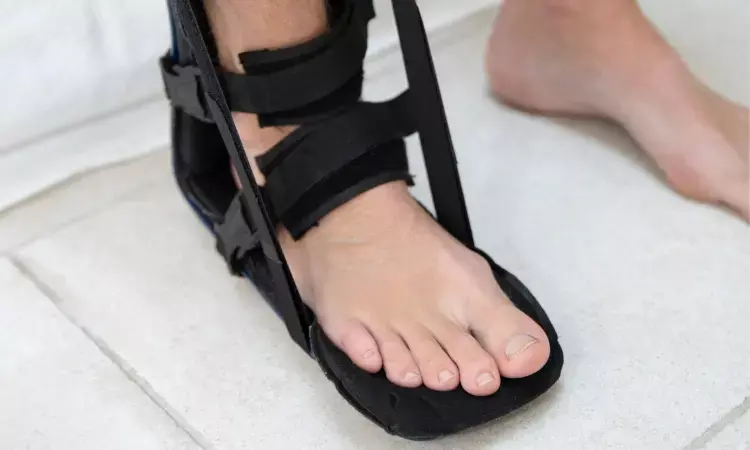- Home
- Medical news & Guidelines
- Anesthesiology
- Cardiology and CTVS
- Critical Care
- Dentistry
- Dermatology
- Diabetes and Endocrinology
- ENT
- Gastroenterology
- Medicine
- Nephrology
- Neurology
- Obstretics-Gynaecology
- Oncology
- Ophthalmology
- Orthopaedics
- Pediatrics-Neonatology
- Psychiatry
- Pulmonology
- Radiology
- Surgery
- Urology
- Laboratory Medicine
- Diet
- Nursing
- Paramedical
- Physiotherapy
- Health news
- Fact Check
- Bone Health Fact Check
- Brain Health Fact Check
- Cancer Related Fact Check
- Child Care Fact Check
- Dental and oral health fact check
- Diabetes and metabolic health fact check
- Diet and Nutrition Fact Check
- Eye and ENT Care Fact Check
- Fitness fact check
- Gut health fact check
- Heart health fact check
- Kidney health fact check
- Medical education fact check
- Men's health fact check
- Respiratory fact check
- Skin and hair care fact check
- Vaccine and Immunization fact check
- Women's health fact check
- AYUSH
- State News
- Andaman and Nicobar Islands
- Andhra Pradesh
- Arunachal Pradesh
- Assam
- Bihar
- Chandigarh
- Chattisgarh
- Dadra and Nagar Haveli
- Daman and Diu
- Delhi
- Goa
- Gujarat
- Haryana
- Himachal Pradesh
- Jammu & Kashmir
- Jharkhand
- Karnataka
- Kerala
- Ladakh
- Lakshadweep
- Madhya Pradesh
- Maharashtra
- Manipur
- Meghalaya
- Mizoram
- Nagaland
- Odisha
- Puducherry
- Punjab
- Rajasthan
- Sikkim
- Tamil Nadu
- Telangana
- Tripura
- Uttar Pradesh
- Uttrakhand
- West Bengal
- Medical Education
- Industry
Staying active, cutting pain-aggravating activities and using heel cup sufficient to reduce pain of Plantar fasciopathy

Researchers have found in a randomised trial that In patients with plantar fasciopathy, simple advice to stay active, minimise pain-aggravating activities, and use a heel cup is sufficient to reduce pain. Further adding heel raises alone or adding heel raises plus a corticosteroid injection did not further reduce pain by a clinically important extent.
The study published in BMJ Journals, British Journal of Sports Medicine has compared the effectiveness of patient advice plus heel cup alone (PA) versus PA and lower limb exercise (PAX) versus PAX plus corticosteroid injection (PAXI) to improve self-reported pain in patients with plantar fasciopathy.
In this study, researchers recruited 180 adults with a history of plantar fasciopathy, as confirmed by ultrasonography. All the patients were randomly allocated to groups:
PA group had 62 participants.
PAX group: PA plus self-dosed lower limb heavy–slow resistance training consisting of heel raises had 59 participants.
PAXI group: PAX plus an ultrasound-guided injection of 1 mL triamcinolone 20 mg/mL had 59 participants.
The team measured the primary outcome as changed in the pain domain of the Foot Health Status Questionnaire. The range was from 0 to 100, from worst to best (baseline till 12-week follow-up).
The research could be summarised as follows:
- After 12 weeks, there was a statistically significant difference between PA and PAXI, favouring PAXI with an adjusted mean difference of −9.1.
- Over 52 weeks, the adjusted mean difference was −5.2.
- They did not find any statistically significant difference between PAX and PAXI or between PA and PAX.
The researchers said, “We did not find clinically relevant between-group differences after 12 weeks.”
The researchers wrote, “Combining a corticosteroid injection with exercise is not superior to exercise or no exercise.”
The study's limitations are the underestimation of results and the loss of follow-up.
As acknowledged in the study, the research was funded by the Independent Research Fund Denmark and other organisations.
Further reading:
https://bjsm.bmj.com/content/early/2023/07/06/bjsports-2023-106948.long
BDS, MDS in Periodontics and Implantology
Dr. Aditi Yadav is a BDS, MDS in Periodontics and Implantology. She has a clinical experience of 5 years as a laser dental surgeon. She also has a Diploma in clinical research and pharmacovigilance and is a Certified data scientist. She is currently working as a content developer in e-health services. Dr. Yadav has a keen interest in Medical Journalism and is actively involved in Medical Research writing.
Dr Kamal Kant Kohli-MBBS, DTCD- a chest specialist with more than 30 years of practice and a flair for writing clinical articles, Dr Kamal Kant Kohli joined Medical Dialogues as a Chief Editor of Medical News. Besides writing articles, as an editor, he proofreads and verifies all the medical content published on Medical Dialogues including those coming from journals, studies,medical conferences,guidelines etc. Email: drkohli@medicaldialogues.in. Contact no. 011-43720751


